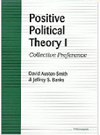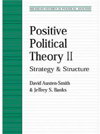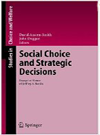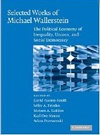Recent Papers
Optimal Experimentation. With Cesar Martinelli.
Gridlock and Inefficient Policy Instruments. With Wioletta Dziuda, Bard Harstad, and Antoine Loeper.
Public Disclosure, Private Revelation or Silence: Whistleblowing Incentives and Managerial Policy. With Timothy Feddersen.

The public revelation of organizational wrongdoing by insiders, whistleblowing, is widely reported, economically significant and can be extremely costly to the whistleblowers. We develop a model of whistleblowing involving a manager and an employee. Each has a privately known type that specifies the relative weight placed on social rather than personal payoffs. The manager chooses a whistleblowing policy consisting of conditional penalties for various employee actions; the employee observes the policy and chooses between saying nothing, revealing a (privately observed) socially costly violation to the manager, or whistleblowing. Given common knowledge of manager types we characterize equilibrium whistleblowing policies and employee behavior. We show that there may be a nonmonotonic relationship between the severity of the violation and the likelihood of whistleblowing. When manager types are private information we provide sufficient conditions for a separating equilibrium. Managerial choice of whistleblowing policies thus serves a dual purpose: providing incentives for reporting violations and providing information to employees regarding the willingness of the manager to fix violations that are privately reported.
A Note on Preference
Uncertainty and Communication in Committee. With Timothy Feddersen.

The recent formal literature on communication in committees indicates that truthtelling in
committee deliberations is more likely under nonunanimous voting rules when individuals'
private interests, or biases, are not common knowledge. The result, however, does not imply
that such bias uncertainty is necessarily welfare improving in some appropriate sense. This
Note suggests that bias uncertainty is in fact welfare improving and, further, argues that even
when committee members prefer that biases be shared, there need not exist any cheap talk
equilibria in which individuals can credibly reveal such information.
Recent Publications
Austen-Smith, David and Timothy Feddersen. 2009. Information Aggregation and Communication in Committees. Philosophical Transactions of the Royal Society. B 364(1518): 763-769.
Austen-Smith, David. 2008. "Political Competition." In New Palgrave Dictionary of Economics, edited by Lawrence Blume and Steven N. Durlauf, London, UK: Palgrave MacMillan, 2nd edition.
Austen-Smith, David and Timothy Feddersen. 2006. Deliberation, Preference Uncertainty and Voting Rules. American Political Science Review. 100(2): 209-217.
Austen-Smith, David and Michael Wallerstein. 2006. Redistribution and affirmative action. Journal of Public Economics. 90(10-11): 1789-1823.
Austen-Smith, David. 2006. "Economic Methods in Positive Political Theory." In Oxford Handbook of Political Economy, edited by Barry W. Weingast and Donald Wittman, 899-914. Oxford and New York: Oxford University Press.
Austen-Smith, David and Roland G. Fryer Jr.. 2005. An Economic Analysis of 'Acting White'. Quarterly Journal of Economics. 120(2): 551-583.
Austen-Smith, David and Timothy Feddersen. 2005. "Deliberation and Voting Rules." In Social Choice and Strategic Decisions: Essays in Honor of Jeffrey S. Banks, edited by David Austen-Smith and John Duggan, Springer-Verlag.
Miscellany
Some corrections to
Positive Political Theory II
Link to pdf (150KB)
Lectures on Voting and Information Aggregation
Compressed folder (905KB)








